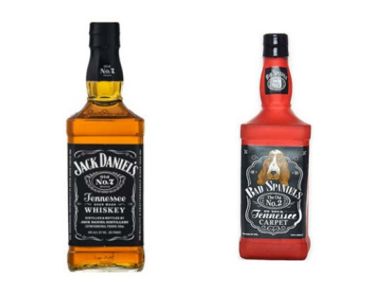- within International Law, Environment and Finance and Banking topic(s)
The US Supreme Court recently handed down its judgment in a trade mark infringement case involving the Jack Daniel's trade mark, Jack Daniel's Properties, Inc. v VIP Products LLC. The case has certainly made the news.
FACTS
VIP Products sold a squeaky dog toy branded Bad Spaniels. No problem there you might think, but this toy was sold in a get-up that is very similar to that of Jack Daniel's. Unsurprisingly, Jack Daniel's sued for trade mark infringement.

THE LOWER COURTS
The first court found for Jack Daniel's, holding that there was both trade mark infringement and dilution. The case went on appeal to the Ninth Circuit, which overruled the earlier decision. This court held that the dog toy was an "expressive work", one that conveyed a "humorous message", and one that was therefore entitled to protection under the First Amendment. The Ninth Circuit court lifted the injunction that barred the making and selling of the dog toy. The case went up further to the US Supreme Court where the lawyers did what they're paid to do, they argued strenuously.
We all like a good joke, but let's get real
Counsel for Jack Daniel's argued that, although "everyone likes a good joke", this joke was "profit motivated" and it impinged on the company's hard-earned goodwill. The lawyer argued that the decision of the Ninth Circuit "invites humourists to infringe the marks of alcohol beverages and other famous brands under the umbrella of the First Amendment."
If it's funny, there's no likelihood of confusion as to origin
VIPs' counsel, on the other hand, argued that "freedom of speech begins with freedom to mock." VIP had, said the lawyer, "merely mimicked enough of the iconic bottle so that people would get the joke."
The lawyer argued that the so-called Rogers test (named after a previous court judgment), which says that an artistically expressive use of a trade mark may be protected by the First Amendment (or in layman's terms, it's okay to use a third party's trade mark for the purposes of fun), should trump the traditional likelihood of confusion test.
THE SUPREME COURT'S JUDGMENT
Judge Elena Kagan handed down the judgment of the court. She made it clear from the outset that this was not going to be the case that says that it's definitely okay to use the trade mark of another for purposes of parody.
Easy does it
Judge Kagan said this: "Today's opinion is narrow. We do not decide whether the Rogers test is ever appropriate. Or how far the 'non-commercial use' exception goes... the use of a mark does not count as non-commercial just because it parodies, or otherwise comments on, another's products."
But using another's trade mark as a trade mark is not OK
The judge went on to say that "when an alleged infringer uses a trademark as a designation of source for the infringer's own goods, the Rogers test does not apply." She said this: "Consumer confusion about source – trademark law's cardinal sin - is most likely to arise when someone uses another's trademark as a trademark."
Being funny cannot be enough
The judge made the point that the earlier court's approach (Rogers case), namely that the Bad Spaniels toy was "automatically entitled to Rogers' protection because it "communicated a humorous message" would have the result that few trademark cases would 'ever get to the likelihood of confusion analysis."
A source identifier
The judge said that in this case, VIP had conceded that it used Bad Spaniels' trademark as a source identifier. So, the only question was whether it was likely to cause confusion.
"We hold only that it is not appropriate when the accused infringer has used a trademark to designate the source of its own goods – in other words, has used a trademark as a trademark. That kind of use falls within the heartland of trademark law, and does not receive First Amendment protection."
As such, the case was remanded to a lower court for determination on whether there was likely to be consumer confusion.
IN SOUTH AFRICA, WE DON'T LAUGH IT OFF
Many IP lawyers in South Africa are quite proud of the fact that South Africa is something of a trendsetter in this area. As many readers will know, the South African Constitutional Court, in a well-known case that is generally referred to as the Laugh-it-off case, held that the parodic use of a well-known beer trade mark (Carling) by a one-man business that manufactured T-shirts that lampooned major brands was protected under the South African Constitution.
The content of this article is intended to provide a general guide to the subject matter. Specialist advice should be sought about your specific circumstances.


